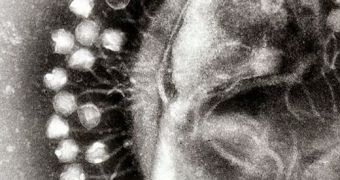Scientists have for a long time wondered how is it that viral agents seem to have this remarkable ability of spreading throughout the hosts they infect with such great speed. Impressive funding and numerous work hours were allotted to figuring this out, and all these investments appear to have finally paid off. Researchers reveal now that the viruses basically “surf” on healthy cells to spread all over the place, while at the same time skipping cells that are already infected. This allows for maximum spread efficiency, the team adds, quoted by LiveScience.
Common knowledge until now had it that viruses could only multiply inside cells, and therefore their replication speed was limited by the amount of time they spent there. Molecular biologists had revealed that the viral agents most likely infected a cell, began to multiply, and only then move out to infect new cells. If this reasoning were true, than the speed of the replication would be controlled by the amount of time the microorganisms spent inside living cells. But a new study on the virus vaccinia proved that this particular agent could travel up to four times faster than initially thought possible.
In videos of infected and healthy cells, collected via microscopes, British researchers at the Imperial College London (ICL) determined that the ability to “bounce” around already infected cells was a key component of this virus' speed. “This fundamentally changes how we think about virus dissemination. Understanding how viruses spread is fundamental to designing strategies to block spread and thereby prevent disease,” explains ICL professor Geoffrey L. Smith, who was also the lead researcher on the investigation.
The new work catches on fresh dimensions when considering that the discoveries it set forth could in the near future be used to produce a variety of antiviral drugs that would target the newly found ability. The group hypothesizes that a number of other fast spreading viruses may employ the same mechanisms, and add that further investigations are on their way to proving that. Details of the groundbreaking ICL achievement appear in the January 22 issue of the top journal Science. The work was only made possible under funding from the Medical Research Council.

 14 DAY TRIAL //
14 DAY TRIAL //